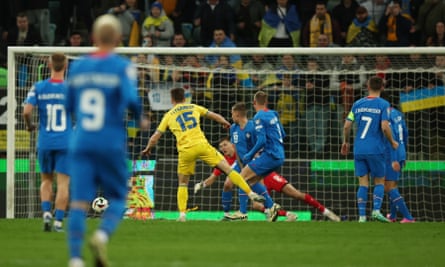On Sunday, Russia escalated its aerial bombardment of Kyiv, launching a major wave of missile and drone attacks. On Monday, 10 people were injured when an art academy and exhibition hall were demolished in an airstrike. On Tuesday, Mykhailo Mudryk’s late winner earned Ukraine a place at Euro 2024, sealing a 2-1 victory over Iceland in the Uefa Path B play-off.
One of these things, evidently, is not like the others. And yet somehow, nor does Ukraine’s qualification for their first major tournament since the beginning of their war with Russia feel like a mere triviality or footnote. On a night of high drama, high emotion and ultimately high celebration, these players – and the thousands of fans who had followed them here – recognised that something more was at stake. They know that these stands will never be their stands, these streets will never be their streets, this turf will never be their turf.
But here, in their home from home 500 miles from the Ukrainian border, they maintained the pretence with a wonderful enthusiasm. They packed out the Ukrainian restaurants and cafes that have been springing up all over the city in the last couple of years. They filled the rush-hour trams, much to the bemusement of the Polish commuters sharing them. They jousted noisily with the couple of hundred Icelandic fans who had staked out a spot in Market Square, meeting their patriotic songs with the famous volcanic clap.
Ukrainian refugees have swelled the population of Wroclaw by about 30% in some estimations, which offers a little perspective the next time some television news channel tries to persuade you that two dozen people in a small boat are a grave threat to the British way of life. They will not always be here, and nor will they always be welcome here. But for the most part, they are welcome now.
And while international football is not war, nor is it the opposite of war. This much has become apparent since the Russian invasion, when we have long become accustomed to press conferences being dotted with casual references to bombs and slaughter, to Oleksandr Zinchenko declaring that Ukraine is “a shield for the whole of Europe”, that “good always triumphs over evil”.

As the teams stepped out into a nearly-full stadium, the outline of Ukraine printed on the giant flag laid across the centre circle included Crimea within its borders. Zinchenko, still evidently not in the right condition to play successive games, was left on the bench here, with Ruslan Malinovskyi replacing him and the fit-again Viktor Tsygankov returning on the right wing.
It was Tsygankov’s crucial equaliser that hauled Ukraine back into the game early in the second half, although to reach that point they had to learn some harsh lessons. Naturally Iceland were tough to penetrate, lashed down in their classic 4-4-2, with their winger dropping in to create a back five depending on which side of the pitch was being attacked. Jón Dagur Thorsteinsson forced a good save from Andriy Lunin with a curling shot from distance, and on the half-hour Albert Gudmundsson slammed them ahead with an unbelievable left-footed strike after a neat lattice of passes on the edge of the area.
Muddled and muzzled, Ukraine bundled forward in attack. First Roman Yaremchuk, replacing Artem Dovbyk up front, slid the ball in after a cross from Tsygankov, only for VAR to rule the goal out for offside. But even amid their frustration, therein lay a template: move the ball quicker with sweeping diagonal balls and blitzing runs.
Tsygankov’s equaliser, curled into the bottom corner after a sumptuous long pass from Georgiy Sudakov, was a justified reward for a spell of sustained quality at the start of the second half.
Finally, with six minutes of normal time remaining, and having weathered more squalls of Icelandic pressure, Ukraine got what they came for. Again Sudakov was the creator, slipping into the right channel and turning the ball inside for Mudryk, whose low finish from 20 yards set off flares in the stands, celebrations in the press box and an agonising siege in the final minutes.
“Making the Euros will help the world to not forget about Ukraine,” Volodymyr Brazhko had said ahead of this match. And of course there is a basic cruelty in the fact that something this important – the visibility, the identity, the very survival of a nation state – can be swung by something as capricious as a game of football.
But the world has been forgetting about Ukraine a little, and if the coming months can provide this nation with a fleeting platform, then it is one they will gratefully accept. After all geopolitics, like football, is a game in which you take the result however you get it.